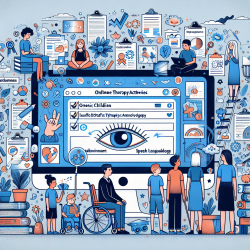Introduction
As practitioners dedicated to improving outcomes for children, it is crucial to stay informed about the latest research and its implications for practice. The study "Psychosocial Intervention for Youth With High Externalizing Behaviors and Aggression Is Associated With Improvement in Impulsivity and Brain Gray Matter Volume Changes" provides valuable insights into how targeted interventions can lead to significant improvements in youth with high externalizing behaviors. This blog will explore the study's findings and discuss how practitioners can implement these insights to enhance their practice.
Understanding the Research
The study focused on the Stop, Now And Plan (SNAP) program, a cognitive behavioral-based psychosocial intervention aimed at improving self-control and reducing externalizing behaviors in youth. The research highlighted two key outcomes:
- Improvement in impulsivity: SNAP participants showed significant improvement in impulsivity measures, aligning their performance with that of healthy controls.
- Brain gray matter volume (GMV) changes: Improvements in impulsivity were associated with GMV changes in the frontotemporal region, suggesting a neurobiological basis for behavioral improvements.
Implementing Research Findings in Practice
Practitioners can leverage these findings to enhance their therapeutic approaches. Here are some strategies to consider:
- Incorporate SNAP principles: Integrate SNAP's cognitive behavioral techniques into your practice to address impulsivity and externalizing behaviors effectively. Focus on enhancing self-control and problem-solving skills in children.
- Utilize brain-based approaches: Consider incorporating non-invasive modalities, such as repetitive transcranial magnetic stimulation, to target specific brain regions and support behavioral improvements.
- Emphasize parent involvement: Engage caregivers in the therapeutic process, providing them with strategies to support their child's development and reinforce positive behaviors at home.
Encouraging Further Research
While the study provides promising insights, further research is needed to explore the mechanisms behind GMV changes and the long-term effects of interventions like SNAP. Practitioners are encouraged to participate in or initiate research projects that investigate these areas, contributing to a deeper understanding of how psychosocial interventions can optimize outcomes for children.
Conclusion
The study on SNAP and its impact on impulsivity and brain GMV offers valuable evidence for practitioners seeking to improve outcomes for youth with high externalizing behaviors. By implementing the study's findings and engaging in further research, practitioners can continue to enhance their skills and provide effective interventions that promote positive development in children.
To read the original research paper, please follow this link: Psychosocial Intervention for Youth With High Externalizing Behaviors and Aggression Is Associated With Improvement in Impulsivity and Brain Gray Matter Volume Changes.










